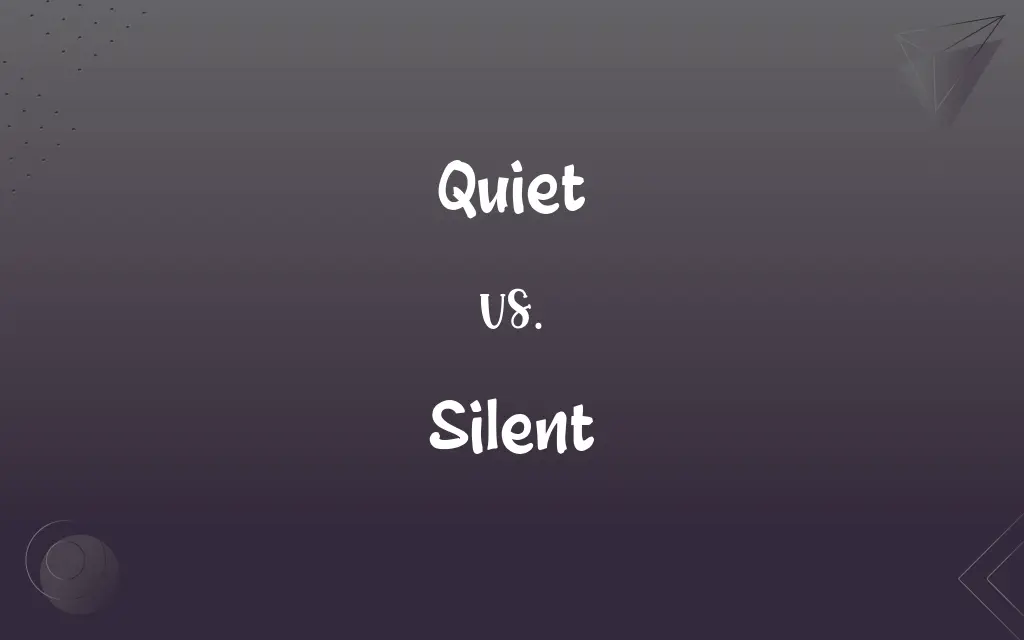Quiet vs. Silent: What's the Difference?
Edited by Janet White || By Harlon Moss || Updated on October 18, 2023
Quiet refers to a low level of noise or calmness, while silent means the complete absence of sound.

Key Differences
Quiet and silent, while similar in many contexts, have distinct nuances in their meanings. Quiet is a term that often suggests relative calmness or reduced noise. A library, for instance, is expected to be quiet, but not necessarily silent. This means that there might still be soft sounds or whispers, but not loud disruptions. Silent, on the other hand, implies a total lack of sound. A silent room means no sound can be heard at all, not even a faint whisper.
In many scenarios, the word quiet is used to suggest moderation, or the toning down of noise or activity. A teacher might ask a class to be quiet, hinting that the students should lower their voices but not necessarily stop talking entirely. Silent, however, denotes a complete cessation of noise. If the same teacher asks for silence, it implies that no student should be speaking or making noise.
Another way to think about quiet and silent is through their levels of intensity. While quiet suggests a subdued or muted atmosphere, silent goes a step further in indicating an environment devoid of sound. A forest at dawn might be described as quiet with the soft rustling of leaves and distant bird calls, but it wouldn't typically be described as silent. Conversely, a recording studio's soundproof booth strives for silence to ensure clean audio recordings.
In certain situations, both words can be used interchangeably, but it's crucial to recognize their differences. A quiet moment may still have the hum of a refrigerator in the background, while a silent moment indicates a pause without any audible disturbances. Recognizing these nuances can add depth and precision to one's expression.
Comparison Chart
Definition
Referring to a low level of noise or calmness
Complete absence of sound
ADVERTISEMENT
Intensity
Moderate or subdued noise
No noise at all
Use in a Sentence
"Keep the room quiet" (some noise is acceptable)
"Keep the room silent" (no noise is acceptable)
Contextual Example
A quiet library might have whispers
A silent library has no audible sounds at all
Associated Feelings
Peaceful, calm
Empty, still, or paused
Quiet and Silent Definitions
Quiet
Calm, tranquil.
He has a quiet demeanor.
ADVERTISEMENT
Silent
Not making any sound.
The forest was eerily silent at night.
Quiet
Free from disturbance or tumult.
The sea was quiet after the storm.
Silent
Not active or in operation.
The factory stood silent and abandoned.
Quiet
Making little or no noise.
The baby is quiet when sleeping.
Silent
Not speaking or communicating.
She was silent on the matter.
Quiet
Carried out discreetly or secretly.
They conducted a quiet investigation.
Silent
Not expressed aloud.
He gave a silent nod of agreement.
Quiet
Not prominent or readily noticed.
She wore a quiet shade of blue.
Silent
Failing to convey information or communicate.
The letter was a silent testament to his feelings.
Quiet
Making or characterized by little or no noise
A quiet library.
A quiet street.
A quiet, well tuned engine.
Silent
Marked by absence of noise or sound; still
The silent forest.
Quiet
Free of turmoil and agitation; calm
A quiet lake.
A quiet place in the country.
Silent
Not inclined to speak; not talkative
He's the strong, silent type.
FAQs
What's more intense, quiet or silent?
Silent is more intense, indicating a complete absence of sound.
Can "quiet" refer to a person's nature?
Yes, a person described as quiet might be reserved or calm.
Is quiet the same as silent?
No, quiet refers to low noise levels, while silent means no sound at all.
What's a synonym for silent?
Mute, noiseless, or soundless are synonyms for silent.
Can a machine be silent?
Yes, if a machine is off or not operating, it can be described as silent.
Do both words have positive connotations?
Both can be positive, like a quiet afternoon or silent agreement, but context is key.
Can a room be quiet but not silent?
Yes, a room can be quiet with soft sounds present but not entirely silent.
Is silence always related to sound?
Primarily, but silent can also mean not speaking on a topic or issue.
What's the opposite of silent?
Noisy or loud would be antonyms for silent.
Can a color be described as quiet?
Yes, quiet can describe subdued or muted colors that aren't loud or bold.
Can a movie be silent?
Yes, silent movies are films without synchronized sound.
Why might someone want quiet instead of silence?
Some people find soft background noise comforting or less stark than total silence.
Is "keep silent" the same as "keep quiet"?
Not exactly. "Keep silent" means not to make any noise, while "keep quiet" means to lower the noise level.
Which is more strict, a quiet zone or a silent zone?
A silent zone is stricter, allowing no sound, while a quiet zone may allow soft sounds.
How does one describe a quiet night?
A quiet night might have soft sounds like distant crickets, but isn't completely silent.
What does it mean if someone remains silent?
It means they're choosing not to speak or comment on a matter.
Can a gesture be silent?
Yes, gestures are inherently silent, like a silent nod, as they don't involve vocalization.
Can quiet be used as a verb?
Yes, as in "quiet the noise" or "quiet down."
Is "quiet" always related to sound?
Mostly, but quiet can also describe calmness, discreet actions, or muted colors.
Can silence be golden?
"Silence is golden" is a proverb meaning sometimes it's better to say nothing.
About Author
Written by
Harlon MossHarlon is a seasoned quality moderator and accomplished content writer for Difference Wiki. An alumnus of the prestigious University of California, he earned his degree in Computer Science. Leveraging his academic background, Harlon brings a meticulous and informed perspective to his work, ensuring content accuracy and excellence.
Edited by
Janet WhiteJanet White has been an esteemed writer and blogger for Difference Wiki. Holding a Master's degree in Science and Medical Journalism from the prestigious Boston University, she has consistently demonstrated her expertise and passion for her field. When she's not immersed in her work, Janet relishes her time exercising, delving into a good book, and cherishing moments with friends and family.































































